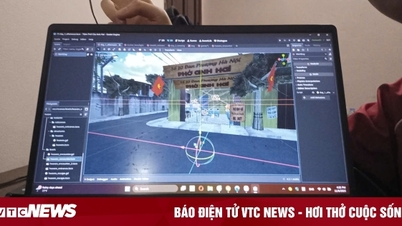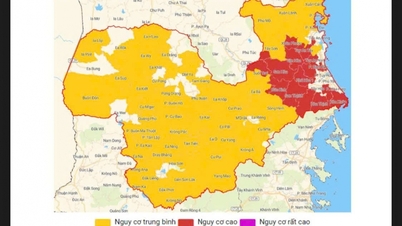
Captain Huynh Do Tan Thinh shares skills to prevent online fraud with students - Photo: TRONG NHAN
Captain Huynh Do Tan Thinh, Special Police Team, Criminal Police Department (Ho Chi Minh City Police), said that young people are currently the group that easily becomes the target of many high-tech scams.
Many sophisticated fraud tricks
On the morning of November 6, at Ho Chi Minh City University of Transport, a seminar on "Identifying and combating fake news in the AI era" was held, organized by Tien Phong newspaper in collaboration with the school.
According to Captain Huynh Do Tan Thinh, although the forms change constantly, most of them revolve around a few common forms: impersonating government agencies or teachers to request information, emotional fraud via social networks, fake recruitment or jobs, and spreading links containing malware to take over phones.
Among them, the so-called "zero-dong shipper" trick has been on the rise recently. Fraudsters often impersonate delivery people, inform victims that they will receive free gifts, and ask for confirmation of receipt.
Taking advantage of curiosity, they lured the victim into a video call, claiming to be an investigator verifying a suspicious parcel.
When the victim is afraid, the subject will ask to cooperate in the investigation in a private place, even requesting to record full-body video or take pictures of body features to verify identity.
These sensitive images were then used to blackmail or intimidate people, demanding transfers of hundreds of millions of dong.
Or there are cases where students are forced to make videos of themselves being kidnapped to ask their families for money. Some students are even tricked into acting as money transfer agents without knowing that they are helping a scam ring.
According to him, the common point of these cases is that the scammers exploit the victims' panic, fear and desire to prove their innocence to control them for a long time.
Not stopping at tricks on social networks, study abroad scams and fake scholarships are also becoming a new trend targeting new students.
Subjects launch secret scholarships or limited funding programs, request money transfers to verify accounts or upgrade profiles.
"Many students trusted the documents because they had a red seal, a fake signature from a foreign school, and the real name of the lecturer," said Captain Thinh. "In one case, the scammer even gave instructions on how to transfer multiple amounts under 500 million VND to bypass the bank."
Worryingly, he warned that the victims are not only students but also their parents. In some cases, parents are being led to believe that their children are arrested and are receiving instructions from fake police officers.
"There was a mother sitting next to the real police officer but still didn't believe it, because she could still hear the fake police officer asking for secrecy," he said.
According to Captain Thinh, the key point is that criminals not only take property but also play on parents' feelings of love for their children, expectations and fear, causing many families to fall into tragedy.

Mr. Vo Do Thang, Director of Athena Cyber Security Center - Photo: TRONG NHAN
4 steps to protect fake news
According to Mr. Vo Do Thang, Director of Athena Cyber Security Center, those behind the current scams and fake news are taking full advantage of artificial intelligence (AI) technology and social networks to manipulate public opinion.
With just one image and a few seconds of recording, AI can create a fake clip with a voice and expression that is exactly like the real thing, making it difficult for viewers to distinguish between real and fake.
Mr. Thang said that there are currently two common attack directions. The first is targeting famous people or prestigious people such as police, journalists, experts, to take advantage of familiar images to create trust.
The second is following major events or natural disasters, when people are more likely to share information without verification.
Faced with this reality, Mr. Vo Do Thang recommends four basic steps to help users protect themselves when facing fake news or online scams.
Step one, don't react hastily when receiving strange information or unusual requests. Ask lots of questions and request verification multiple times because just doing so will easily make the scammer lose his composure or reveal his weakness.
Step two, if your information has been exposed or threatened, absolutely do not follow requests such as transferring money, moving to a certain location or sending more data; try to delay, avoid letting fear dominate.
Step three, immediately notify relatives, colleagues or authorities, to break the state of psychological isolation that the scammer wants to maintain.
Step four, when the matter is serious, contact a cybersecurity expert or a specialized agency for timely technical support.
Source: https://tuoitre.vn/nhieu-thu-doan-lua-dao-nham-vao-sinh-vien-tu-shipper-0-dong-den-hoc-bong-bi-mat-20251106105921557.htm


![[Photo] Prime Minister Pham Minh Chinh receives the delegation of the Semiconductor Manufacturing International (SEMI)](https://vphoto.vietnam.vn/thumb/1200x675/vietnam/resource/IMAGE/2025/11/06/1762434628831_dsc-0219-jpg.webp)

![[Photo] Closing of the 14th Conference of the 13th Party Central Committee](https://vphoto.vietnam.vn/thumb/1200x675/vietnam/resource/IMAGE/2025/11/06/1762404919012_a1-bnd-5975-5183-jpg.webp)













































































































Comment (0)